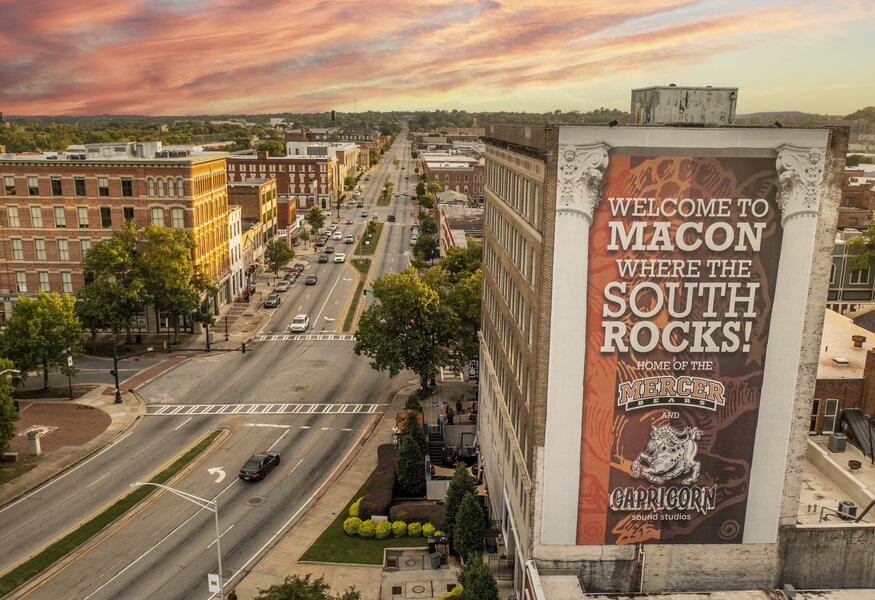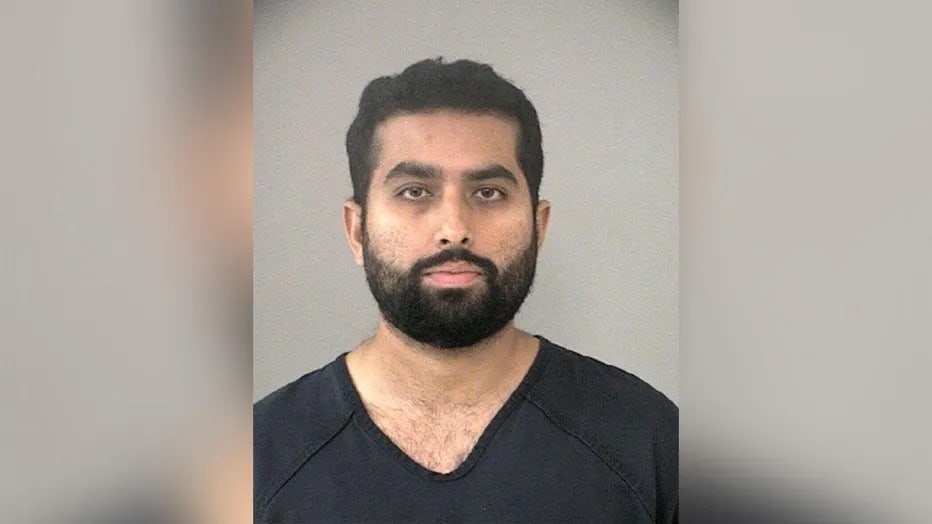California
Rapper Sean Kingston Arrested in California for Fraud After SWAT Raids His Florida Home

Rapper Sean Kingston was arrested in California on Thursday on fraud charges, several hours after a SWAT team raided his rented South Florida home.
The Associated Press reported that Kingston, whose real name is Kisean Anderson, was taken into custody on a Florida warrant near Fort Irwin, California, according to the Broward County Sheriff’s Office.
Earlier on Thursday, authorities said they arrested the rapper’s 61-year-old mother, Janice Turner, following a raid on his mansion in Southwest Ranches, Florida. The AP reported that the sheriff’s office hasn’t released details about specific charges, citing an ongoing investigation.
Reporters outside his home said they could see authorities putting items in a van, according to the AP. The mansion was also surrounded by expensive-looking sports cars.
Kingston wrote on his Instagram Story earlier in the day, “People love negative energy! I am good, and so is my mother! … My lawyers are handling everything as we speak.”
The Hollywood Reporter has reached out to the rapper’s representatives for comment.
Robert Rosenblatt, an attorney representing Kingston and his mother, told the AP, “We are aware of some of the allegations” being made against both of them.
“We look forward to addressing these in court and are confident of a successful resolution for Shawn and his mother,” Rosenblatt wrote in an email.
The AP reported that an attorney who witnessed Turner’s arrest said it was partly related to a lawsuit he filed against Kingston in February accusing him of defrauding a Florida company that installed a 232-inch television in his home.
Kingston is most known for his 2007 single “Beautiful Girls,” which topped the Billboard Hot 100 chart for four weeks. He also scored two other Top 10 hits with “Take You There” and “Fire Burning,” as well as collaborated with Justin Bieber on 2011’s “Eenie Meenie.” The rapper hasn’t had a major label release in more than a decade.

California
Michigan Pot Market Surpasses California in Sales Volume
Michigan has overtaken California as the largest cannabis market in the U.S., at least in terms of sales volume, according to data collected by multiple market intelligence firms. Both firms show Michigan surpassing California over the winter in cannabis product units sold.
Sales volume is the total number of units sold by a business over a specific period of time, such as units sold in a month, quarter, or year. A “unit” can mean several different things but in this case, it refers to a single or multipack cannabis item that is purchased, big or small.
But this is in terms of units, and California is still a larger cannabis market than Michigan in terms of dollars sold—by billions of dollars. California sold $5.1 billion in adult-use cannabis products in 2023, while Michigan sold about $3 billion in adult-use cannabis products.
Prices for cannabis products are much cheaper in Michigan compared with California due to recent oversupply issues in the Great Lakes State. That means that even if consumers buy more products in Michigan, the total amount they spend is less than what they’re paying in California.
Detroit Free Press reports that since December 2022, Michigan has sold more total grams of flower and units of other cannabis products, called equivalent unit sales, in both the adult-use and medical cannabis markets compared with California, according to data collected by BDSA, a cannabis market intelligence firm that tracks sales via point-of-sale data from a panel of participating cannabis retailers.
But it’s not just BDSA making these claims: Headset, another cannabis market intelligence firm that’s recognized in the cannabis community, compiled data showing that Michigan sold more units than California. Headset defines units as a single item that a customer buys, such as a pre-rolled joint, a multipack of pre-rolled joints, an ounce or one gram, since June 2023. Headset’s data indicates that in May, Michigan sold 24.2 million units, compared to California selling 17.3 million units.
“There are a lot of issues on the ground in California … it’s always been expensive to do business there,” Michael Arrington, a principal analyst at Colorado-based BDSA, said on a BDSA market forecast update webinar in March.
According to BDSA data, Michigan sold 56.8 million equivalent units of cannabis products in April, compared with 44.6 million in California during the same month.
In terms of units sold, BDSA arrived at slightly different numbers than Headset, however both firms found that Michigan was selling more units of cannabis products than California in recent months, such as in February and March. Michigan’s unit sales first passed California’s in December, BDSA data shows.
This could mean more Californians are buying in bulk or in larger units while Michiganders are buying cannabis in smaller units.
In Michigan, prices for cannabis plunged after adult-use cannabis sales started because of an oversupply problem, which led to lower prices for consumers but tougher margins for cannabis retailers.
Michigan Sales On Steady Climb
A recent set of data released by the Michigan Cannabis Regulatory Agency (CRA) shows that the state has once again set a new record for adult-use cannabis sales.
According to the CRA, the state collected $286.8 million in adult-use cannabis sales in March, which made up for 99% of all sales. In terms of product popularity, flower still reigns supreme with $131.4 million in sales. A total of $54.4 million was sold in vape cartridges, as well as $33.9 million in inhalable concentrates, and finally edibles at $26.3 million.
The CRA splits Michigan up into five distinct regions: upper lower/upper peninsula, mid lower, southwest, east/southeast, and Wayne.
Among these regions, the east/southeast region collected the most in total adult-use cannabis sales with $128,929,767, followed by $79,432,048 in the southwest region, $31,845,920 in Wayne, $29,373,053 in upper lower/upper peninsula, and lastly, $17,209,468 in the mid lower area.
In total medical cannabis sales, the southwest area led with $141,535, followed by Wayne with $945,992, east/southeast with $809,515, upper lower/upper peninsula with $81,273, and finally mid lower with $79,695.
The latest figures leave more questions than answers. Michigan’s population is about a quarter of the size of California’s population, and California’s history of a medical and adult-use cannabis market stretches back further than Michigan’s. But the prices of pot play a large part in the outcome of units sold in both markets,
Michigan’s fifth anniversary of adult-use cannabis sales in the state is coming up, and the state is proving its viability, even compared to California’s enormous market.
California
Big-box chains are funding a California ballot measure to crack down on retail theft, setting up clash with progressive lawmakers

With retail theft increasing, California Democratic leadership is clashing with a coalition of law enforcement and business groups in a fierce political fight over how to crack down on the problem. State lawmakers are trying to preserve progressive policies and stay away from putting more people behind bars.
The two most likely paths under consideration this year are a ballot initiative to create harsher penalties for repeat offenders, and a legislative package aimed at making it easier to go after professional crime rings.
Leaders behind the two efforts have accused one another of misleading voters and being unwilling to work toward a compromise.
How did we get here?
Both sides agree on the need to crack down, especially on large-scale thefts in which groups of people brazenly rush into stores and take goods in plain sight.
At the center of the escalating political fight is Proposition 47, a progressive ballot measure passed by voters in 2014 that reduced certain theft and drug possession offenses from felonies to misdemeanors — in part to mitigate overcrowding in jails and prisons. That includes nonviolent property crimes such as thefts under $950.
It has made it harder to arrest and punish people who shoplift, law enforcement said. Researchers told lawmakers there’s no evidence linking the proposition to increased violent crime rates.
How are the two solutions different?
A coalition of district attorneys and businesses, mostly funded by big box retailers, is pushing for an initiative to bring harsh penalties for shoplifting and drug offenses. It would make theft of any amount a felony if the person already has two theft convictions.
Possession of fentanyl would also become a felony, and those with multiple drug charges would be ordered to get treatment.
The ballot measure would still need to be certified by the Secretary of State before it could be placed on the ballot later this month.
California’s Democratic leadership, backed by Gov. Gavin Newsom, wants to keep the tough-on-crime measure off the November ballot. They worry the ballot measure’s proposal would disproportionately criminalize low-income people and those with substance use issues rather than target ringleaders who hire large groups of people to steal goods for them to resell online.
Instead, lawmakers are fast-tracking a legislative package of 14 bills that would go after organized online reseller schemes and auto thieves, and provide funding for drug addiction counselors. These proposals could become laws as early as this month.
Do the efforts conflict?
If voters approve the tough-on-crime ballot initiative, Democratic leaders plan to void most measures in their own legislative package, citing potential conflicts.
Lawmakers were short on details about how the two paths conflict earlier this week. Later, they said they fear if both efforts succeed, law enforcement would be able to stack penalties and send more people to jails, leading to mass incarceration and overcrowded jails.
About a third of the measures in the package pose possible legal conflicts with the proposals in the ballot initiative, according to lawmakers.
The ballot initiative campaign accused lawmakers of holding the proposals hostage to break up the coalition. Local district attorneys who backed the ballot campaign said both efforts could work together, with the ballot measure overriding the legislative package in case of legal conflicts.
What happens next?
Backers of the ballot initiative said they’re still open to working with Democratic leadership but will only consider any solutions that involve rolling back Proposition 47.
“We still stand ready to sit down with anybody in leadership to talk about the measure, but I don’t want to compromise,” Greg Totten, a retired district attorney and a leader of the ballot initiative campaign, said during a news conference this week.
Newsom and Democratic leaders have until June 27 to negotiate to get the initiative off the ballot. Meanwhile, lawmakers have plans to deliver the legislative package to Newsom’s desk by next week for signing, despite growing concerns from moderate Democrats.
“When you look at the package that we put together, it’s very comprehensive and it addresses a number of details in the existing framework of the law,” Assemblymember Rick Zbur, author of a retail theft bill, told reporters. “It was never intended to be something that was stacked on to a ballot measure that removed the underpinnings of the basic law that we were trying to reform.”
California
R&B Singer Angela Bofill Dead at 70 in California

Angela Bofill – the R&B vocalist best known for her songs, “I Try” and “Angel of the Night,” has died.
Bofill passed away at her daughter’s home in Vallejo, California. Her cause of death was not disclosed, but she had previous health issues.
In 2006 and 2007, Bofill suffered two strokes, causing paralysis on the left of her body.
Bofill’s friend and manager, Rich Angel, announced her death Friday in two Facebook posts, saying her family was “saddened” by the news.
Born in NYC, Bofill rose to fame in the ’70s with a bunch of hits, including “I Try,” “Angel of the Night,” “This Time I’ll Be Sweeter” and “What I Wouldn’t Do (For the Love of You).”
Her success continued through the ’80s, ’90s and early 2000s – catching the eye of music mogul Clive Davis at one point. Davis was the head of Arista Records, which produced several of Bofill’s albums.

Last year, Bofill was inducted into “The Women Songwriter’s Hall Of Fame.”
TMZ Studios

She is survived by her husband Chris and daughter Shauna.
Bofill was 70.
RIP
-

 News1 week ago
News1 week agoIsrael used a U.S.-made bomb in a deadly U.N. school strike in Gaza
-

 World1 week ago
World1 week agoFrance to provide Ukraine with its Mirage combat aircraft
-

 World1 week ago
World1 week agoRussia-Ukraine war: List of key events, day 833
-

 News1 week ago
News1 week agoNonprofit CFO Accused of 'Simply Astonishing' Fraud
-

 Politics1 week ago
Politics1 week agoGeorge Clooney called White House to complain about Biden’s criticism of ICC and defend wife’s work: report
-

 Politics1 week ago
Politics1 week agoNewson, Dem leaders try to negotiate Prop 47 reform off California ballots, as GOP wants to let voters decide
-

 World1 week ago
World1 week ago‘Bloody policies’: Bodies of 11 refugees and migrants recovered off Libya
-

 Politics1 week ago
Politics1 week agoEmbattled Biden border order loaded with loopholes 'to drive a truck through': critics



















